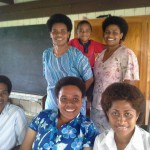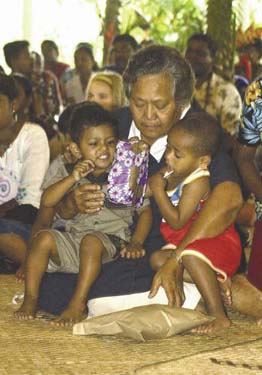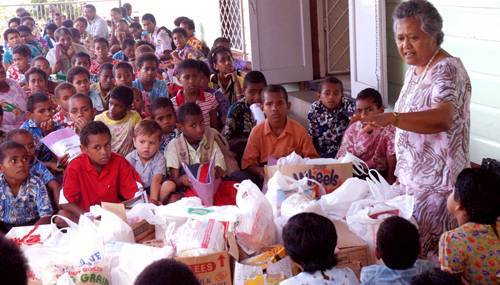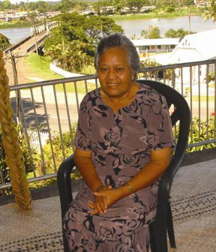Fiji: Methodist Deaconess Order in Fiji
Denomination: Methodist Chuch in Fiji
Church head office: Epworth House, Stewart Street, Suva, Fiji Tel: (679) 3311 477
History (Published in “Off The Wall” Fiji Times – 9th February, 2011, source: Rev James Bhagwan)
1878
From as early as 1878 missionary sisters have served the Methodist Church in Fiji, teaching in schools, caring for orphans, providing medical and nursing care and engaging in evangelistic, pastoral and social and community work.
1953
In 1953, the Fijian Synod of the Methodist Church of Australasia appointed the first Deaconess Committee because all Fijian annual meetings had recommended to the Synod the establishment of a Deaconess Order.
1966
In around 1966, three women, Miss Mulya Dharanji, Sister Ethel Brent and Mrs Gladys Campbell bought a property for the purpose of setting up a Deaconess Training Centre. A multiracial group of volunteers along with the first four deaconess students prepared the house for occupation.
10th February, 1967
On February 10th, 1967, classes began for the student deaconesses. The 10th of February is celebrated each year as Deaconess Day in the Methodist Church Calendar.
Important people in the history of the Deaconess Order
Pauline Campbell
Pauline Campbell was a past headmistress of Dudley House School and a strong advocate of equal participation of women in the ordained ministry of the Methodist Church in Fiji and Rotuma. She was instrumental in the establishment of the Deaconess Order of the Methodist Church in Fiji and Rotuma.
In the words of A. Harold Wood, “So strongly was she convinced of the needs of religious and social welfare work among Fijian and Indian women in urban areas that she promoted the foundation of the Deaconess Order in Fiji. She was a supervisor of deaconess training. After retiring, she decided to return to Suva to support the Mission’s programme. The Deaconess Order, proving a boon to the women of both races, is a monument to her wise oversight and her spirit of complete devotion to the Church’s mission in Fiji.”
In August 2011, ‘Pauline Campbell House’ was opened, in her honour and to recognize her championing of equal participation of women in the ordained ministry, and the establishment of the Deaconess Order in Fiji.
Olovia Kauroto Nataniela – scroll down to see Olovia’s obiturary.
Deaconess Meresiana Kuricava
Deaconess Meresiana Kuricava is the current Administrator of the Deaconess Order. She lives with eight student deaconesses who stay in the dormitory at the Deaconess Training Centre.
Roles and responsibilities of a deaconess
Deaconesses have served as chaplains in Schools, Religious Education teachers and in pastoral appointments as assistants to ministers. Sometimes their roles are misunderstood and as a result undervalued by the ministers and communities they serve in.
What is a Deaconess ?
According to the United Methodist Church’s General Board of Global Ministries (USA) Web Site:
A deaconess is a professionally competent lay woman commissioned to ministries of love, justice, and service. The United Methodist Church has a rich history of 100 years of ‘sending forth’ Deaconesses who have played and continue to play a vital role in the Mission of the Church throughout the United States.
Deaconesses helped establish community centers, orphanages, schools, hospitals, and clinics. Homes for Immigrant women and outreach ministries in both rural and urban settings were also part of the ministry. Whatever their professionals training, deaconesses concentrate their efforts among those who are poor, oppressed, ostracised and geographically isolated.
Deaconess are lay women who:
- Affirm being called by God to lifetime service through the church.
- Are committed to Jesus Christ and dedicated to mission.
- Are committed to love, justice, and service.
- Are professionally trained in their chosen field.
- Complete theological and missionary studies.
- Are commissioned by and have a relationship with the General Board of Global Ministries
Training and formation
Deaconess candidates complete study and formation requirements for diaconal ministry as set out by the Meth
odist Church in Fiji.
Challenges
44 years since the training of Deaconesses began in Fiji, with a new Administrator and staff, the Deaconess Training Centre and Deaconess Order is at a crossroads and is reflecting on its relevance and rethinking its mission. Many, in
cluding the current leaders of the Deaconess Order believe the time has come for the Vada ni Turaga – “Servants” or “Messengers of the Lord” to begin to make a difference in new areas of the community through specialised ministries such as children’s ministry, providing care for the aged and hospital ministry.
Writing in the late 1980’s Miss Campbell, who died in 2009 aged 85, stated that, “the church has not yet had a vision of the potential of deaconesses for innovative and outreach work,”adding that in other countries, it was normal for s
ome deaconesses to be working in appointments outside the church, with church approval.
She went on to say that, “it is to the areas of greatest need in the community, and to the guidance of the Spirit, that the deaconess, the (Deaconess) Committee and the Church should look to.”
In recent years final-year student deaconesses have written a project paper, from which they must develop in to a workshop and implement during their probationary period. The issues such as child abuse, violence against women, poverty and other current issues, including the impact of the media in society may perhaps point the way for the re-envisioning of the role of the Deaconess order.
Methodist Church in Fiji and Rotuma Conference (Bose Ko Viti) by Bruce Mullan
The Conference was held in the Centenary Church on 29th to 31st August 2012. This was the first time the church has been allowed by the Interim Government to hold the conference since 2008.
Approval for the Conference was issued with eight conditions that had to be observed prior and throughout the meeting. The church was required to acknowledge these conditions and were told that “serious actions will be instituted if [the restrictions were] violated or contravened”. The conditions for the conference to be stringently observed were:
- the meeting should not coincide with the Hibiscus Festival which will be held from August 17-25:
- the meeting is to be held for three days only;
- the meeting is to be conducted on Wednesday, Thursday and Friday respectively;
- the meeting is to be held from 8am to 8pm;
- the meeting is to be confined to the Centenary Church premises;
- the church matters only are to be discussed;
- no political issues are to be discussed; and
- no request of extension of time frame can be made during the meeting proper.
The permit also stated that no other activities are to be entertained such as the choir competition, erecting of stalls/bazaar or any form.
Prior to each session of the Conference General Secretary Rev Tuikilakila Waqairatu reminded people of the condition that no political issues were to be discussed.
Following elections, Rev Tuikilakila Waqairatu will be the new President of the Methodist Church in Fiji and Rotuma. Rev Tevita Nawadra was overwhelmingly appointed as the new General Secretary and current Davuilevu Theological College Principal Rev Dr Epineri Vakadewavosa will be Deputy General Secretary. Former Suva Mayor Ratu Peni Volavola was elected as Assistant President. The elected office holders will take up their appointments on 1 January 2013.
Rev Tuikilakila said the church would need to work positively with the government in the formulation of the new constitution and preparations towards the general election in 2014. He said although the government had closed the doors from communicating with the church, he would look at other avenues to revisit leaders, to maintain relationships and continue positively forward. He was also reported as having said that the Methodist Church will be working on strengthening its interfaith relationships.
Following the Conference on Sunday 2nd September an ordination service was held in the Centenary Church Suva for Misisters and Deaconesses. Two deaconesses were ordained and 26 as Talatalas (ministers). Seven of the 26 were women.
Deaconess Olovia Nataniela by Malagrani (nee Mani) Smith
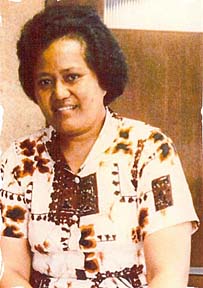 |
|
Deaconess Olovia Nataniela
|
Olovia was born in Motusa, Itu’ti’u, in November 1938, the youngest of nine children born to Nataniela Veragtuamaoi of Haroa, Motusa and Akesa Vafo’ou from Losa. Two of her siblings died in infancy and an older sister died in childbirth at the age of twenty-three. Her father, who was a fa hua’i (lay minister) in the Methodist Church, died before she was born, and her mother died young, at age forty-three when Olivia was twenty-one years old.
Soon after she was born, Olovia was embraced and included as mapiag (grandchild) in the family of the late Gagaj Jotam Tigarea, who was chief of Itu’ti’u district and the first local, resident doctor, and his late wife, Sarote Tigarea. They had eight children of their own (two of whom died before Olovia joined them), so she grew up in a household with four “uncles” and two “aunts” as well as her adoptive parents. Sarote Tigarea imparted love and Christian values to her, and was a central figure in Olovia’s life. She assumed a teacher/mother/friend role, taught, and led by example throughout Olovia’s childhood, adolescence, into adulthood.
Therefore Pslam 27 is particularly meaningful to Olivia. In her own words: “When my father and mother died; God took care of me. I wish to acknowledge and pay tribute to all who raised me with unselfish love from birth to now.”
Olivia has dedicated her life to service within the Methodist Church. She was first “sent forth” as one of four Fiji locals, and ordained deaconess during one of the early Methodist Church of Fiji & Rotuma Conferences. Her work as a deaconess began amongst the Indian, Fijian, and Rotuman communities in various parts of rural and urban Fiji. She was posted to Rotuma twice, from 1970-1972 and from 1982-1984.
In her role as deaconess, Olovia participated in programs training youths and women for leadership roles in Fiji and Rotuma. She has also attended international conferences and training programmes in Canada, Hawaii, Korea, Japan, Bangladesh, and India.
In 1987 she was appointed to Dilkusha (“Happy Heart,” or “Delight to the Heart”) Children’s Home in Nausori. She was the first local person to be appointed superintendent, a position previously held exclusively by medical sisters who usually came from Australia or New Zealand. In September 2004 Dilkusha Children’s Home marked its centennial with a week-long celebration. The Rotuman community in Nausori provided mats and food for the celebration, and took the opportunity to honour Deaconess Olovia for her hard work and for the pride she has brought to the Rotuman community.
Deaconess Olovia has also received national recognition in the form of an “Order of Fiji” award for service to the community.
As part of the centennial celebration, Deaconess Olovia gave these words of gratitude and thanks:
Luke 1:46 “My Heart Praises the Lord My Soul is Glad because of God My Saviour”
” I am indeed very grateful for the initiative taken to publish this booklet to celebrate the great ocassion of the Centennial Celebration of the DilkushA Home. Foremost I must thank the Almighty God for the showers of blessing he has bestowed on the Home, and for His Spirit’s touching and moving the hearts of those humble people who contributed towards the welfare of the children since its inception in 1904.Through the years I have wittnessed many significant physical, social and spiritual developments that have reflected the ongoing growth of the Dilkusha Home. We are greatly indebted for the many resources provided by the efforts of those of the past, and it is important that we continue that development in the future.Many girls have come and gone, finding good jobs and a secure family, and echoing their grateful sentiments for their upbringing at their ‘Happy Home’. On behalf of the Dilkusha Home, I sincerly thank the Methodist Church in Fiji and Rotuma, the Department of Social Welfare, the Indian Division of the Methodist Church, The Dilkusha Church and many other ‘Good Samaritans’ who are always in the depth of our hearts for their generous and combined efforts in moving the Home forward as it is today.Sincere thanks to business people, friends in Fiji The Australian Aiding Inc, Australian Inter-Country Aid, Uniting Church of Australia, General Board of Global Ministries. The original purpose of the establishment of the Dilkusha Home should always be intact, as it is laid on a platform in nuturing our children in their spiritual relationship with God. Jesus said; “I tell you, whenever you did this for one of the least important of these followers of mine, you did it for me!” (Mattew 25: 40)May I also take this oppertunity to wish you all God’s blessings on this great ocassion. (Extract from Methodist Church in Fiji booklet, “100 years ‘With a Happy Heart,” 2004.)Mother and father to forgotten children (from Fiji Times Online,1 January 2009)She spends her days and nights caring selflessly for her loved ones – children of all ages, races and colour – who need constant help and love. And for this woman, The Fiji Times Person of the Year, life with children is as intense at the age of 70 as it was 21 years ago. GERALDINE PANAPASA tells her story.
OLOVIA Kauroto Nataniela was born 70 years ago on November 3, 1938.Youngest in a family of seven, she wanted to be a nurse but God had other plans for her.She was going to be a Florence Nightingale all right, but her patients would be younger, more vulnerable and completely helpless.When her father died, her grandparents took charge and instilled values and virtues that have helped shape and mould her into the person we all know as Deaconess Olovia Nataniela.When her grandmother became ill, a young Olovia left school at Class 8 to care for her.”My grandmother and mother were caring women,” she recalls.”Through her (grandmother), I learnt to love and care. She also taught me to love the church.”When her grandmother died, she came to Suva and worked at a clothing factory.She was still heavily involved in church work, taught scriptures at Sunday School, joined the choir and attended Bible studies, and was president of the Rotuman Methodist Youth Fellowship in Suva.In 1965, she went to a youth convention in Western Australia and met Deaconess Litia Rabuku.When she returned, her mind was made up it was to join the Deaconess Order in the Methodist Church of Fiji.She studied for three years – from 1967 to 1969 – did two years probation in Rotuma and was ordained in 1971.”I enjoy just being a servant of the Lord,” Deaconess Olovia said.She first set foot in Dilkusha Children’s Home in 1967 when she had to complete a one-month practical.She remembered the work there as being hard because everything was done manually.But the children captured her heart and the missionary sisters at the home taught her a lot.From 1978 to 1979, she was given a scholarship by the church to study child care in New Zealand.Before she finally settled at Dilkusha Home in 1987, Deaconess Olovia travelled to places she never thought she would visit.She joined Youths With a Mission in Hawaii for a year, then was off to Asia, the Holy Land, Nairobi and Geneva.Her experiences broadened her knowledge and deepened her faith and love for the church.”I saw that to know the Lord, you have to work with people all the time. You have to work with faith too,” Deaconess Olovia said.”I thought when I came to Dilkusha, I couldn’t travel anymore.”But because God has done so much for me, I said it was time for me to serve.”I’ve never regretted coming here.”It’s very rewarding and I think if I retired, the home is well established.”I really want to thank the Deaconess Order, the Government and the Department of Social Welfare, my helpers here and the community for supporting Dilkusha.”Without them, I may never get anywhere.”Maybe this recognition is a testimony and encouragement to look after your own families and for me it has to be the Lord.”FACT FILE
- Deaconess Kauroto Nataniela was born on November 3, 1938.
- Her mother, Akesa Vafo’ou, is from Losa and her father, Nataniela Veriangtir Maoi, is from Haroa clan in Motusa.
- Her father was a church catechist.
- She likes to eat taroro, rourou and seafood.
- Her favourite drink is coconut juice.
- She was one of two co-ordinators to lead youths on an exchange scheme to Canada in 1975 under the Ministry of Youth.
- She was the secretary for Women’s Fellowship in Fiji and Rotuma for the Methodist Church from 1984 to 1986.
- She’s a recipient of the Paul Harris Rotary NSW Award from Australia for community service.
- She’s a recipient of the Ambassador for Peace International Award.
- She’s a recipient of the 2008 Westpac Community Service Award.
From Fiji Times Online (9 October 2010)A good leader loves, commits, dedicatesby Geraldine PanapasaBEING a good leader requires commitment, dedication and love, says Deaconess Olovia Nataniela, head of the orphanage, Dilkusha Children’s Home, in Nausori.She first set foot in Dilkusha after she joined the Deaconess Order in the Methodist Church of Fiji and Rotuma in 1967 where she had to complete a one-month practical training.Deaconess Olovia was appointed to Dilkusha in 1987 and has since dedicated her life to the underprivileged children of the home.Widely known and recognised for her selfless love and care for the children, Deaconess Olovia says leadership requires humble qualities.”For me, it was the upbringing from home, my little island of Rotuma, where I learned and felt the love within the family,” she said.”Love in the home is very important.”What I’ve learnt from faith and my upbringing has made the person I am today.”In terms of leadership, I think there are many challenges and responsibilities that come with it.”I believe a good leader is someone who is constantly committed and believes in what they are doing. You have to possess these qualities in your heart, commit yourself and love what you are doing,” Deaconess Olovia said.She said the children of the home had always been her main priority and concern.”In the morning before the children go to school, I must sit with them and pray for them before they go,” she said.”I believe that education for children is very important.”Originally from Motusa in Rotuma, Deaconess Olovia was brought up by her grandmother.She said the virtues and values instilled in her early life made her the woman she is today.”Growing up, I never thought I’d be a leader but what I have learnt is from my faith in God and his love.”When people ask me how I came to know God, I tell them it was through my upbringing in Rotuma,” Deaconess Olovia said.”The support and people I meet that come to the home, I’ve also learnt from them. We cannot be a good leader on our own.”I wish all the leaders of the country all the best.” Deaconess Olovia continues to be mother and father to about 28 children at the home.
From Fiji Times Online (23 January 2011)Shocking news for ‘mother’by Monika SinghDEACONESS Olovia Nataniela has looked after abandoned children at the Dilkusha Children’s Home for the past 40 years and now she is being replaced by someone else.She said she had not received any word from the Methodist Church but heard it on the Methodist Church radio program Raici Jisu Matua.When The Fiji Times arrived at the Dilkusha Children’s Home yesterday, Deaconess Olovia was very emotional as she talked about how much time she spent with the children at the home.She said she did not want to make any comments on the retirement order from the Methodist Church in Fiji and Rotuma’s Fijian division.Instead, she said, she wanted to wait for the church to discuss the issue within the church members before she made any public comments.Yesterday Deaconess Olovia prayed for the children at the home and asked God to give them strength to live with whatever decision the church made.The children from the home were distraught when they were told by Deaconess Olovia of the change on Friday night.She said the children of the home were like her own and she only wanted the best for them.Head of the Methodist Church in Fiji’s Indian division, Reverend William Lucas, said they were shocked at the manner in which Deaconess Olovia was treated.Mr Lucas said the Dilkusha Children’s Home was administered by the Indian division because they had their Dilkusha church there but now the Fijian division of the church was in charge.”We are shocked at this news because Deaconess Olovia had been asking the church for a long time to arrange for an understudy who could look at how things are done and meet her contacts who help at the home,” Mr Lucas said.”But her request was not taken into account. And now the church just comes up and gives her notice to retire and move out of the cottage at the home.”Mr Lucas said Deaconess Olovia was not told by the church but she heard it over the air.”This is no way to treat a woman who gave more than 20 years of her life to the church and to the children at the home.”There should have been some consultation on the issue with the Dilkusha Home Council and Deaconess Olovia but it was not done,” Mr Lucas said.Mr Lucas said the children at the home who have treated Deaconess Olovia as their mother were shocked by the news.”This has also taken a toll on her health and we are very worried about her,” he said.Methodist Church assistant general secretary Reverend Tevita Banivanua yesterday said the directive from the church for Deaconess Olivia’s retirement was not forced nor sudden.Mr Banivanua said the church had discussed the matter with Deaconess Olovia last year because it believed she was old enough to retire.”She is 73 years old and she was supposed to retire a few years ago and the church had appointed an understudy to see how things were managed at the home so that she could take over from Deaconess Olovia when she retired,” Mr Bainivanua said.He said they were aware that Deaconess Olovia had spent most of her life looking after the children and she was emotionally attached to the home and the children.”We know it will take time for her to leave the children and that is why we arranged for a replacement to stay with her for some time,” he said.Mr Banivanua insists the church had told Deaconess Olovia of its decision.
From Fiji Times Online (7 March 2011)Dying Mum says thanksby Ilaitia Turagabeci
DEACONESS Olovia Nataniela, the Dilkusha Home matron forced to retire by the Methodist Church, has pleaded with Fiji’s citizens not to forget “my children”.Bed-ridden since her removal as head of the home in January and “counting her last days”, Mother, as she is known at the home, called on the country to protect and look after the welfare of all children, regardless of their race or religion.”Children are our gift from God. We must not forsake them,” said the 73-year-old deaconess.”I was called to serve the Lord and the children of Dilkusha became my children. They have brought me great joy and I thank the Lord for the beautiful gift that they are.”Parents should value this gift for in children we see Christ.”People from walks of life around the country and abroad, including former children of the home, called the deaconess and visited after hearing of her deteriorating health in the past month.Choirs from the Deaconess Order in Samabula and Churchwood Chapel visited over the weekend and stood outside her cottage overlooking Dilkusha Home to sing songs and offer prayers. “The children came from all over, from Lautoka and Navua, and they have been crying. All that I can say to them is that it has been a privilege to know and serve the Lord,” she told The Fiji Times.”I’ve come to know so many people through this work, people who have stood by the home all these years, some of them non-Christians, but people with the welfare of the children in their hearts. God will bless them.”Deaconess Olovia first heard of her removal on the radio and the church’s Indian division, which has managed the home for more than 100 years until its takeover by the church headquarters late last year, had strongly opposed it, saying it was unfair on the deaconess and that an understudy should have been appointed first.Indian divisional superintendent Reverend William Lucas said Deaconess Olovia’s health condition was “because of her removal from Dilkusha Home”.”She is very weak and counting her last days. She is only thankful for all the prayers and the love shown to her by people of all races and of different religions. This has made it peaceful for her,” he said after conducting holy communion for her yesterday.Methodist Church acting general secretary Tevita Banivanua had told The Fiji Times that it had informed the deaconess of its decision and that her replacement had understudied Deaconess Olovia for some years before being transferred.Despite her suffering, Deaconess Olovia would not comment on her removal, only saying she was happy for her life “and now I’m ready for my Lord”.”I’m glad to leave the home nice and beautiful for the children,” she said.”And to all those who helped make the home the way it is, please continue.” Methodist Church in Fiji and Rotuma – early history
- Established in 1835 through the Wesleyan Missionary Society (WMS) via Tonga in the persons of David Cargill and William Cross (London, England)
- These missionaries arrived in Lakeba with their families and accompanied by some Tongans on October 12th, 1835.
- Christianity (or the LOTU, called by both Tongans and Fijians) had a peaceful entry into Lakeba because both, the Tui Toga (King of Tonga) and the Tui Nayau (the paramount chief of Lakeba) are bloodly related.
- From Lakeba (Tubou – its head village) Christianity then spreaded to Rewa, Bau, Somosomo, to chiefs of the Western part of Fiji and eventually the whole of Fiji.
- The spread of Christianity in Fiji, by and large, was done through mass evangelism i.e. whenever the chief became “Lotu” or converted his subjects too followed likewise.
- Individual conversion became a later issue when the rationalization of faith came later as phase two in the evangelism strategy of the missionaries.
Information to be collected includes (but is not limited to) the following questions.A brief history (may include links to documents and websites) – how did it all get started? What are the key dates and events? Are there documents that are part of the history (please specify)? Diaconal ministry agents: consecretrated/commissioned/ordained/other?Title: Sister, Deaconess, Deacon, Rev, etcHistorical information and dates re formation/recognition of diaconal ministry agents in the denomination/church agency. Does the diaconal ministry agent wear a distinctive uniform? Are diaconal ministry agents able to be married? Are they remunerated? Do they live in community (eg motherhouse) or independently? Etc. What kind of training/formation do diaconal ministry agents receive before formal recognition in their church. Are there expectations of ongoing training, or professional development? If yes, what is expected and how often does it happen? How many diaconal ministry agents are there currently in the denomination or church agency? Any comment on trends in numbers?Are there key people (historical or current) in the organization who have provided significant leadership. Any weblinks to their story, or a short write up?Who are the current leaders in the diaconal association? (photos, ‘blurb’). Relationship of diaconal ministry agents to a denomination/church agencyAn overview of main responsibilities for diaconal ministry agents (past and present). Are they located within a church, a particular facility or agency, or community based? Are diaconal ministry agents appointed to individual placements or work together on projects or in institutions? Are diaconal ministry agents able to preside at sacraments (communion, baptism, weddings etc)?Who makes the appointments for diaconal ministry agents eg they apply for positions, they are appointed (eg by a Bishop, by the conference office, or another body/committee). Is there a length of time for appointments (eg usually less than 5 years, usually between 5 and 10 years, at the discretion of the diaconal ministry agent or at the discretion of the appointing body), appointed to and remain with a particular mother house, etc. Do diaconal ministry agents organize conferences, seminars, gatherings for professional development, pastoral peer support etc? How often and what is the nature of these events?Key issues and challenges in the contemporary ministry contextDo the diaconal ministry agents have ‘code of conduct’ or ‘code of ethics’ that inform ethical and behavioral expectations for ministry?Key documents (historical, vision and mission etc) – links or PDF or Word filesPhotosLinks to relevant articles, websites etcOther areas of interest……(information to Rev Sandy Boyce, President, DIAKONIA World Federation, sandyeboyce@gmail.com, to upload to this website)
